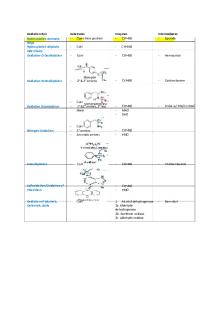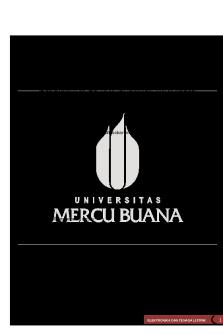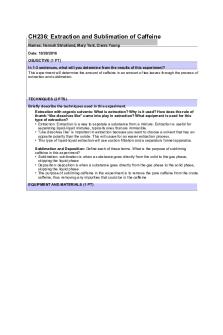PHIL Argument Extraction Worksheet Phase 1 PDF

| Title | PHIL Argument Extraction Worksheet Phase 1 |
|---|---|
| Author | Anonymous User |
| Course | Contemporary Moral Issues |
| Institution | Sam Houston State University |
| Pages | 4 |
| File Size | 86.9 KB |
| File Type | |
| Total Downloads | 75 |
| Total Views | 125 |
Summary
Required Homework Completed...
Description
Phil 2306 Argument Extraction Worksheet Phase 1 Name______________________ The purpose of this worksheet is to help you practice extracting arguments from texts. Use this worksheet together with one of the assigned text-excerpts. Make sure you complete all six steps. Each step is worth 2 points for a total of 12 points. You get 1 point for each step just for trying.
What is the title of the text you are extracting an argument from? Text: Rachels, James, "The Challenge of Cultural Relativism" from Steven M. Cahn Exploring Ethics, 5th ed. (Oxford University Press, 2020). Step 1: Begin by identifying the conclusion of the argument. State it in one sentence: - According to Cultural Relativism, the idea of moral progress is impermissible; a social reformer cannot legitimately challenge the ideals of his or her society, except when their society is not living up to its ideals and regards the reformer as acting for the best, then the ideals of the society are the standard by which they judge the reformers proposals as worthwhile. Step 2: How does the author support the conclusion? Present the support in premise form. Use complete sentences, but only one sentence per line. You may not need to use all the lines. Add more lines if needed.
- If Cultural Relativism is correct, 18th century society was a different society from the one we have today and saying that we have made “progress” implies a judgment that presentday society is better, and according to Cultural Relativism, that is impermissible. -
If the old ways were in accordance with the social standards of their time, then Cultural Relativism would say it is a mistake to judge them by the standards of a different time.
-
According to Cultural Relativism, a social "reformer" may not challenge the ideals of their society themselves, for those ideals are by definition correct.
According to Cultural Relativism, the idea of social reform only makes sense in a very limited way, in which the society is not living up to its own ideals, regards the reformer as acting for the best, and then the ideals of the society are the standard by which they judge the reformers proposals as worthwhile.
See second page!
Phil 2306 Argument Extraction Worksheet Phase 1 Step 3: Now put Steps 1, and 2 together to form an argument Number the premises and conclusion
Premise 1. Cultural Relativism says it is a mistake to judge social standards of a different time as moral progress. Premise 2. Moral progress means replacing a way of doing things with a better way. Premise 3. It is impermissible in Cultural Relativism to say that a present-day society is better than one in the past. Premise 4. Within the constraints imposed by Cultural Relativism, if a society is not living up to its own ideals, the reformer may be regarded as acting for the best: the ideals of the society are the standard by which we judge his or her proposals as worthwhile. Premise 5. According to Cultural Relativism, the social reformer may not challenge the ideals themselves, for those ideals are by definition are correct. Conclusion: According to Cultural Relativism, the idea of moral progress is impermissible; a social reformer cannot legitimately challenge the ideals of his or her society, except when their society is not living up to its ideals and regards the reformer as acting for the best, then the ideals of the society are the standard by which they judge the reformers proposals as worthwhile.
See second page!
Step 4: Is this argument an enthymeme? Yes or no: __NO______ If yes, what do you think the missing premises are? List them:
-
There are no implied premises.
Step 5: Add the missing premised in step 4 to the argument you identified in step 3 to form a complete argument. If the argument was not an enthymeme, skip this step. Number the premises and conclusion.
N/A
Step 6: Evaluate the argument. Is it sound? Explain your answer. (Keep in mind that you don’t have to agree with the argument or Professor Bachman!) Identify controversial premises and state whether you agree with them or not
This argument is sound because it is a valid argument with true premises. Cultural Relativism is defined as, “The idea that a person's beliefs, values, and practices should be understood based on that person's own culture, and not be judged against the criteria of another.” This argument is based on Cultural Relativisms’ beliefs and should not be questioned if they are “correct.” Meaning, one does not have to believe or practice the ideals of Cultural Relativism in order to hold these premises as true.
Notes on Terminology: 1. Validity is a property of ARGUMENTS as a whole, and not a property of premises. In other words, premises cannot be valid or invalid, only an ARGUMENT can. (I recognize that this is not how people normally think of the word "validity." But this is how philosophers and logicians use the word. It is not my idiosyncratic usage, I promise.) 2. Validity itself is not concerned with whether any given premises are in fact true. It is rather concerned with the relation between premises and conclusion. IF the premises are true, THEN the conclusion must also be true. The question to ask yourself, then, is "what if these premises were true?"
Phil 2306 Argument Extraction Worksheet Phase 1
See second page!...
Similar Free PDFs

Phase changes worksheet
- 2 Pages

PHASE 1: STRATEGIC PLANNING
- 1 Pages

ERD+ Phase 1 database
- 1 Pages

Phase 1 and phase 2 reactions
- 8 Pages

TRAFO 1 PHASE DAN 3 PHASE
- 13 Pages

Phil Constitutions - Sheet 1
- 1 Pages

Argument Essay #1
- 8 Pages

Phase 1 - Thank you
- 28 Pages

WS F Phase Change Problems Worksheet
- 10 Pages

Argument
- 3 Pages

Argument 1 - Jay-Z Essay
- 7 Pages

DNA Extraction
- 5 Pages
Popular Institutions
- Tinajero National High School - Annex
- Politeknik Caltex Riau
- Yokohama City University
- SGT University
- University of Al-Qadisiyah
- Divine Word College of Vigan
- Techniek College Rotterdam
- Universidade de Santiago
- Universiti Teknologi MARA Cawangan Johor Kampus Pasir Gudang
- Poltekkes Kemenkes Yogyakarta
- Baguio City National High School
- Colegio san marcos
- preparatoria uno
- Centro de Bachillerato Tecnológico Industrial y de Servicios No. 107
- Dalian Maritime University
- Quang Trung Secondary School
- Colegio Tecnológico en Informática
- Corporación Regional de Educación Superior
- Grupo CEDVA
- Dar Al Uloom University
- Centro de Estudios Preuniversitarios de la Universidad Nacional de Ingeniería
- 上智大学
- Aakash International School, Nuna Majara
- San Felipe Neri Catholic School
- Kang Chiao International School - New Taipei City
- Misamis Occidental National High School
- Institución Educativa Escuela Normal Juan Ladrilleros
- Kolehiyo ng Pantukan
- Batanes State College
- Instituto Continental
- Sekolah Menengah Kejuruan Kesehatan Kaltara (Tarakan)
- Colegio de La Inmaculada Concepcion - Cebu



